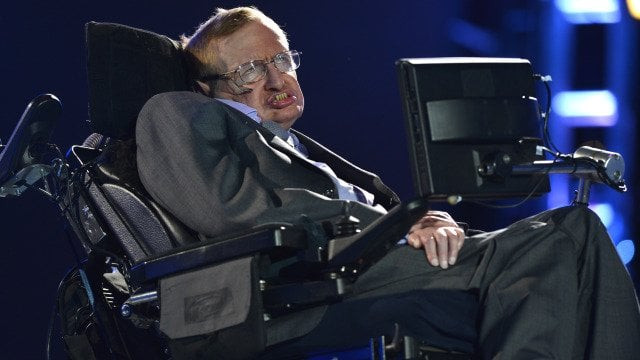Disability — dividing lines
Our education system does not have adequate provision for accommodating disability

British scientist Stephen Hawking. PHOTO: AFP
Despite his disability, Hawking went on to solve one of the greatest mysteries of the universe and published best seller A Brief History of Time.
Disability as defined by WHO is “any restriction or lack (resulting from any impairment) of ability to perform an activity in the manner or within the range considered normal for a human being.” It is estimated that 15% of the world’s population (around 1 billion) have a disability of some sort. People with disabilities (PWDs) are special to every society. In developed countries much attention is paid towards facilitating this segment of the society so that they become active contributors of the society as well as economy. In Pakistan much needs to be done towards enablement of our disabled population which is currently viewed with sympathy and pity, rather than enabled for playing an active role in social and economic development of the country.
The data available for people with disabilities in Pakistan is sketchy; 1998 census reported the country to have 3.3m people having some form of disability with Sindh leading at 3.05%, Punjab with 2.48%, Baluchistan with 2.23% and NWFP with 2.12% of their total population. Figures reported in 2017 census cannot be relied on as decision to count disabled people was made last minute on the orders of Supreme Court. As such counting was carried out without any plans of effective implementation. The 3.3 million of our differently-abled segment of society (2.1 m rural and 1.2m urban) remains largely marginalized from mainstream education, employment and public places.
Our education system does not have adequate provision for accommodating disability. It is estimated that of the 25 million out of school children, almost 1.4m are disabled. These figures are in line with global statistics where percentage of out of school children with disabilities is higher than those with no disability. The exclusion from mainstream education is detrimental for young children as it inculcates feelings of low confidence and self-esteem. Exclusion at educational level transcends into difficulty in seeking respectful employment. According to WHO, only 14% of Pakistan’s disabled are employed. Although the government has introduced a 2% quota for disabled people in all public and private organizations, further increased to 3% only for Punjab; there is a lot of debate on calculation and applicability of formula as well as penalty for non-compliance. The biggest issue here remains that organisations are not adhering to regulations and have neglected to incorporate them into HR strategies.
Terror war adds to K-P's disabled population
In social spaces, PWDs are faced with multiple challenges as provisions are not made to facilitate them in public places such as malls, parks and roads. On one hand whilst no heed is paid towards construction of buildings accommodating needs of special people, there is also a non-existent culture of being comfortable with disability around us. Furthermore, as a society a lot of support is given by close family members to the disabled, it is more infused with pity and a feeling of inadequacy. Such an attitude inculcates feelings of low self-esteem thereby undermining their confidence and drive towards achievement.
Gender distribution for women with disabilities also follows the global trend whereby women face more challenges than their male counterparts. This is primarily because the risks of prejudice, violence and rape are much higher for women. In Pakistani society, the situation is amplified due to cultural barriers which keep them confined to their homes. Access to education and employment is a remote possibility limiting their engagement with the society let alone economy. There is no published data available on women in Pakistan who face disabilities.
In order for Pakistan to have a fair society that provides equal opportunities we must make sincere efforts for inclusion of PWDs into our economic and social mainstream. Creating awareness can begin in early years where special children are included in the regular school system; our children can learn to accept and appreciate diversity in all its forms from a very young age. A similar model needs to be adopted at organizational levels also. Organizations must hire, train and create opportunities for the disabled. Additionally, provisions should be made to accommodate needs of special people in all public and private buildings. Above all, there needs to be a mindset towards providing opportunities for PWDs so they are enabled to contribute towards social and economic development of the country.
To close I quote Stephen’s powerful words, “My advice to other disabled people would be, concentrate on things your disability doesn’t prevent you doing well, and don’t regret the things it interferes with. Don’t be disabled in spirit….” Like Stephen, we must empower and enable our differently abled population so that they realise their potential, regain self-esteem and play their part towards the growth of our country.
Published in The Express Tribune, April 15th, 2018.
Like Opinion & Editorial on Facebook, follow @ETOpEd on Twitter to receive all updates on all our daily pieces.















COMMENTS
Comments are moderated and generally will be posted if they are on-topic and not abusive.
For more information, please see our Comments FAQ